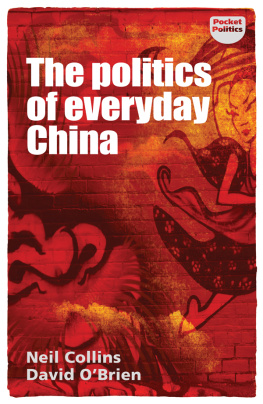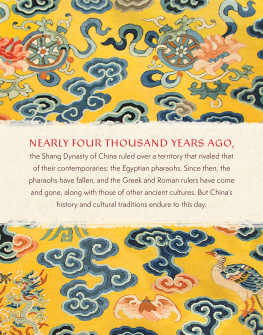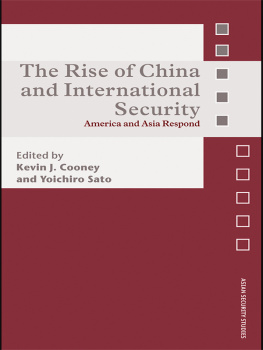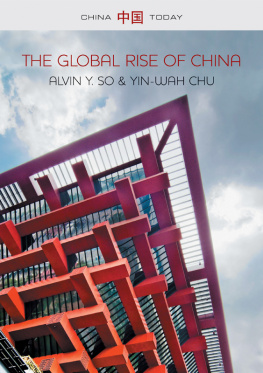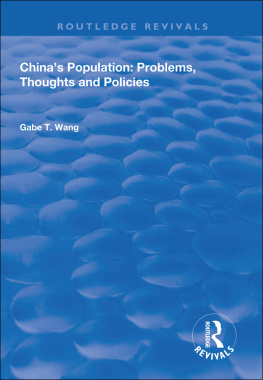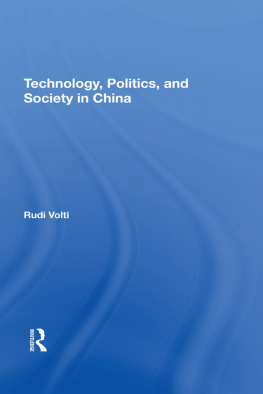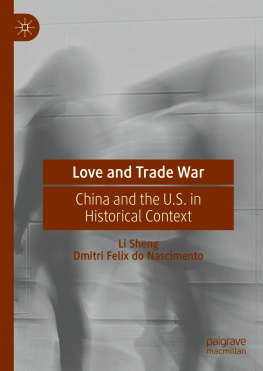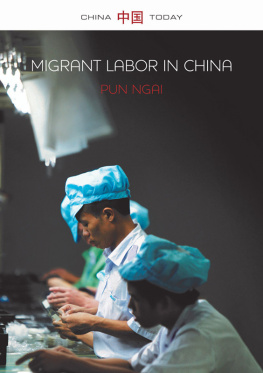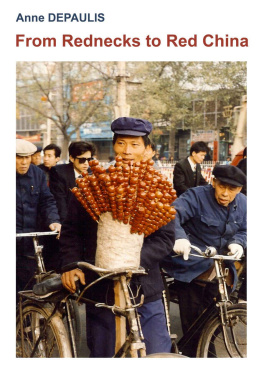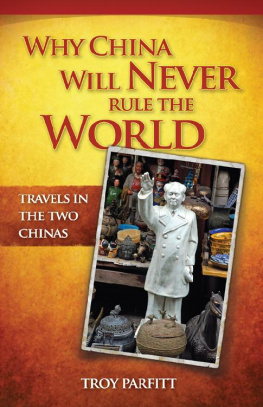The politics of everyday China
POCKET POLITICS
SERIES EDITOR: BILL JONES
Pocket politics presents short, pithy summaries of complex topics on socio-political issues both in Britain and overseas. Academically sound, accessible and aimed at the interested general reader, the series will address a subject range including political ideas, economics, society, the machinery of government and international issues. Unusually, perhaps, authors are encouraged, should they choose, to offer their own conclusions rather than strive for mere academic objectivity. The series will provide stimulating intellectual access to the problems of the modern world in a user-friendly format.
Previously published
The Trump revolt Edward Ashbee
Lobbying Wyn Grant
Power in modern Russia Andrew Monaghan
Reform of the House of Lords Philip Norton
Government by referendum Matt Qvortrup
Transatlantic traumas Stanley R. Sloan
The politics of everyday China
Neil Collins and David OBrien
Manchester University Press
Copyright Neil Collins and David OBrien 2019
The right of Neil Collins and David OBrien to be identified as the authors of this work has been asserted by them in accordance with the Copyright, Designs and Patents Act 1988.
Published by Manchester University Press
Altrincham Street, Manchester M1 7JA
www.manchesteruniversitypress.co.uk
British Library Cataloguing-in-Publication Data
A catalogue record for this book is available from the British Library
ISBN 978 1 5261 3180 5 paperback
First published 2019
The publisher has no responsibility for the persistence or accuracy of URLs for any external or third-party internet websites referred to in this book, and does not guarantee that any content on such websites is, or will remain, accurate or appropriate.
Typeset by Out of House Publishing
In memory of Denis
For Shani
Contents
Boxes
Each evening at sunset in Beijings vast Tiananmen Square, soldiers of the Peoples Liberation Army (PLA; ) march from the Forbidden City through the Gate of Tranquillity in perfect formation for the lowering of the national flag. It is an impressive sight of precision and power and always gathers a large crowd of tourists and other onlookers. This ceremony draws a direct line from the traditions of imperial China, taking place at what was the spiritual heart of the empire, to the birth of the Peoples Republic of China (PRC; ), announced on this spot by Mao Zedong () in October 1949. From an enormous portrait on the gate, Chairman Mao still gazes down on the ceremony, flanked on either side by the slogans Long Live the Peoples Republic of China and Long Live the Great Unity of the Worlds Peoples. Other slogans nearby celebrate current Party and State leader Xi Jinpings () Chinese Dream of National Rejuvenation. As the soldiers carefully lower the flag, standing among the crowd are numerous tall young men in smart white shirts and black slacks carrying large black, folded umbrellas. These are plainclothes security officers, and their job is to watch for any possible disturbance. The umbrellas are to shield any such unpleasantness while protestors are whisked away. The security men also have a fire extinguisher by their feet in case of self-immolation from monks or other demonstrators, which has occurred in Tibet and other areas of China. This is, after all, the sight of student protests in 1989 which almost brought the Chinese Communist Party (CCP) to its knees.
This combination of an ostentatious celebration of the power of tradition with such anxiety is perhaps symbolic of where the PRC is today. On the one hand, it is more prosperous, more stable, more confident and more peaceful than it has been at any time in the past 200 years, possibly ever. There remains however a grave apprehension for the authorities that disorder and chaos are close by and that the hard-won harmony () and civilisation () are under threat. President Xi has repeatedly stressed the importance of reading Confucius () for todays Chinese, in a marked difference from his predecessor Mao who wanted all trace of Confucius eliminated. In the Confucian tradition, a leader must above all else ensure order and stability. If he fails and chaos breaks out, the mandate of heaven () will be removed and the empire will fall. Xi, Chinas most powerful leader since Mao, is determined to not let that happen.
| BRI | Belt and Road Initiative |
| CCDI | Central Commission for Discipline Inspection |
| CCP | Chinese Communist Party |
| CMC | Central Military Commission |
| NPC | National Party Congress |
| PLA | Peoples Liberation Army |
| PRC | Peoples Republic of China |
| SOE | State-owned enterprise |
| VPN | Virtual Private Network |
The economic, diplomatic and technological achievements of China, when compared to those of other countries and regions, have long been the focus of intense scrutiny and speculation, yet accounts of the political changes that underlie Chinas recent remarkable story vary greatly in their concentration. Some try to identify long-standing historical patterns dating to the earliest dynasties and before. Other more contemporary studies emphasise the geopolitical elements that underpin Chinas rise. A common theme is the relative strength and durability of the political models of governance offered by an authoritarian China versus the liberal democracies of the West. In this book, however, the aim is to provide the reader with insights into ways in which politics affects the everyday lives of Chinese people. This is not to understate the impact of political culture the deeply embedded distinctive patterns of political, economic and social behaviour that fundamentally shape politics. Indeed, the critical difference in the reaction of Chinese citizens, compared with other people, to superficially similar innovations and events can only be fully understood with reference to such cultural distinctiveness.
This book looks at how the contract between the Chinese state and its citizens produces compliance and apparent support despite the problems of corruption, food scandals, air pollution and the constraints on personal freedom. It explores how Chinas past is presented as both a mandate for a party-political monopoly and a promise of a glorious future. It does so through the voice of Chinas people, by exploring the lived experiences of her citizens across a wide range of socio-economic, rural, urban, ethnic and religious backgrounds.
Though frequently portrayed and indeed depicting itself as a homogenous monolith, the PRC is full of contradictory and fascinating complexity. From its multi-ethnic population of hugely varied languages, races and religions to its contrasting landscapes of futuristic mega-cities and rural poverty, it is a land of enormously diverse people and places. The Politics of Everyday China explores some of the critical issues from the perspectives of the newly prosperous middle classes, ever more pressurised by skyrocketing house prices and living costs, and of farmers and workers once idealised in revolutionary propaganda, who feel increasingly marginalised. From the ideologies of Marxism-Leninism and Mao Zedong that are taught by the ruling Communist Party to the ultra-consumerism of its shopping centres and millionaires, China is a nation of sometimes uncomfortably coexisting ideas and narratives.

